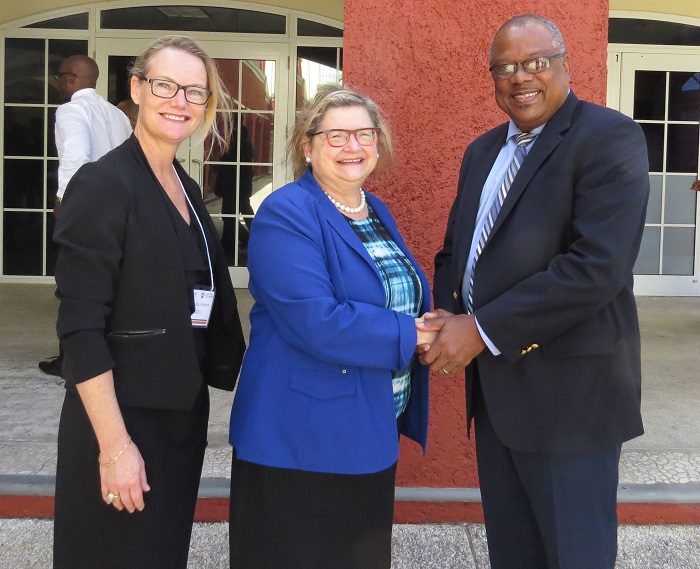
Resource Mobilisation Needed To Fight HIVDeclaration came from Minister of Health, Barbados, John Boyce as he addressed the opening of a two-day workshop on Domestic Resource Mobilisation for HIV in the Caribbean
Image: Health Minister, John Boyce, greeting Deputy Chief of Mission, US Embassy, Laura Griesmer. At left is Health Office Director, USAID Eastern and Southern Caribbean, Julia Henn (Photo credit: The Barbados Government Information Service – BGIS)
As external aid for HIV programmes decreases across the Caribbean, an increased mobilisation of domestic resources is necessary to ensure sustainability and continued access to programmes in affected countries.
This declaration came from Minister of Health, Barbados, John Boyce as he addressed the opening of a two-day workshop on Domestic Resource Mobilisation for HIV in the Caribbean at the Courtyard by Marriott.
The meeting has brought together technocrats from Ministries of Finance and Health in Barbados, Guyana, Suriname and Trinidad and Tobago.
The primary objectives are to discuss the most urgent priorities for problem-solving and funding HIV and to develop a country-specific action plan to ensure countries are able to respond with their own resources in the face of the expected decline in external financing.
Mr. Boyce maintained that the “huge mobilisation of resources” for the global HIV response over the course of the epidemic had been unprecedented in the history of public health.
In the last decade, he disclosed, tremendous progress had been made in the prevention, care, and treatment of HIV. He noted the massive rollout of antiretroviral treatment, adding that because of dedicated programmes within countries and increased funding, HIV-related health outcomes had improved and HIV incidence had stabilised and even declined in some countries.
However, he stated, the shift towards domestic funding was now necessary as external aid declined, with the United States, which remained the largest contributor to the global HIV response, proposing cuts of almost 20 per cent amidst competing demands for donor budgets.
The Health Minister told the audience: “I therefore encourage you to support your own programmes and strategies for mobilising domestic resources and take responsibility for your own needs. As Health Ministers, we are often the most aware of the challenges the health sector faces in regard to ineffective or insufficient spending. Thus, we can play an important role in creating advocacy messages that put health at the top of our governments’ agendas.”
Mr. Boyce submitted: “Shifting the funding paradigm towards domestic funding is challenging, but it has the advantages of fostering ownership and accountability in the implementation of the national HIV response and increasing its sustainability.”
WHAT IS PANCAP?
PANCAP is a Caribbean regional partnership of governments, regional civil society organisations, regional institutions and organisations, bilateral and multilateral agencies and contributing donor partners established on 14 February 2001. PANCAP provides a structured and unified approach to the Caribbean’s response to the HIV epidemic, and coordinates the response through the Caribbean Regional Strategic Framework on HIV and AIDS to maximise efficient use of resources and increase impact, mobilise resources and build the capacity of partners.
What are the Global AIDS Strategy 2021–2026 targets and commitments?
If targets and commitments in the strategy are achieved:
- The number of people who newly acquire HIV will decrease from 1.7 million in 2019 to less than 370 000 by 2025
- The number of people dying from AIDS-related illnesses will decrease from 690 000 in 2019 to less than 250 000 in 2025.
- The goal of eliminating new HIV infections among children will see the number of new HIV infections drop from 150,000 in 2019 to less than 22,000 in 2025.
What are the 95-95-95 Targets for ending AIDS?
- 95% of People Living with HIV know their HIV status;
- 95% of people who know their status on treatment; and
- 95% of people on treatment with suppressed viral loads.
HELPFUL LINKS:
Global AIDS Strategy 2021–2026, End Inequalities, End AIDS
https://pancap.org/pancap-documents/global-aids-strategy-2021-2026-end-inequalities-end-aids/
Caribbean Regional Strategic Framework on HIV and AIDS (CRSF) 2019-2025
https://pancap.org/pancap-documents/caribbean-regional-strategic-framework-2019-2025/
